Vietnam's German Success: Ho Chi Minh Students' €3,100 Ausbildung Breakthrough
Ho Chi Minh City students achieve €3,100 breakthrough in German Ausbildung. Vietnam's pathway to German success revealed.

Table of Contents
- Understanding Vietnam-Germany Ausbildung Partnership
- Historical Cooperation Between Vietnamese and German Education Systems
- Current Bilateral Agreements and Government Support Programs
- Success Metrics and Growing Participation Rates
- The €3,100 Ausbildung Model Explained
- Breakdown of the €3,100 Monthly Compensation Structure
- Comparison with Traditional Apprenticeship Wages in Germany
- Additional Benefits and Support Packages for Vietnamese Students
- Ho Chi Minh City Students Leading the Way
- Profile of Successful Vietnamese Ausbildung Participants
- Most Popular Programs and Industries Among HCMC Students
- Academic Preparation and Selection Criteria
- Application Process and Requirements
- Step-by-Step Application Timeline for Vietnamese Students
- German Language Proficiency Requirements and Preparation
- Documentation, Visa Procedures, and Pre-Departure Preparations
- Life in Germany: Cultural Integration and Adaptation
- Housing Arrangements and Living Costs Breakdown
- Cultural Differences and Adaptation Strategies
- Support Networks and Vietnamese Student Communities
- Career Prospects and Long-term Opportunities
- Post-Ausbildung Employment Rates and Career Progression
- Pathways to Permanent Residency and Citizenship
- Return Opportunities and Skills Transfer to Vietnam
- Financial Planning and Budgeting Guide
- Monthly Expense Breakdown for Vietnamese Students in Germany
- Savings Potential and Financial Management Tips
- Comparison with Education Costs in Vietnam and Other Countries
- Alternative Programs and Comparison
- Other German Vocational Training Options for International Students
- Comparison with University Degree Programs
- Similar Opportunities in Other European Countries
- Frequently Asked Questions
- Question 1: What are the exact language requirements and how long does it take to prepare?
- Question 2: How do I handle the application timeline and what documents need apostille certification?
- Question 3: What are the realistic living costs beyond the €3,100 salary, and how should I budget?
- Question 4: How do I find and secure accommodation before arriving in Germany?
- Question 5: What happens if I struggle academically or want to change my Ausbildung field?
- Question 6: How does the pathway to permanent residency work after completing Ausbildung?
- Question 7: What support networks exist for Vietnamese students, and how do I access mental health resources?
- Question 8: Can family members join me, and what are the financial requirements for family reunification?
- Conclusion
Imagine earning €3,100 monthly while gaining world-class vocational training in Germany's robust economy. For students from Ho Chi Minh City, this isn't just a dream—it's becoming reality through Germany's revolutionary Ausbildung program that's transforming Vietnamese careers and lives.
While many students worldwide struggle with mounting education debt and uncertain job prospects, Vietnamese participants in Germany's dual education system are earning substantial salaries while learning cutting-edge skills in industries ranging from automotive engineering to digital technology. The €3,100 monthly compensation represents more than many university graduates earn in their first jobs, making this pathway increasingly attractive for ambitious Vietnamese youth.
The success stories emerging from Ho Chi Minh City are particularly compelling. These students aren't just surviving in Germany—they're thriving, building international careers, and creating pathways for future generations. However, navigating this opportunity requires understanding complex application processes, cultural adaptation challenges, and long-term planning considerations that many students find overwhelming.
This comprehensive guide addresses the most pressing questions Vietnamese students face: How realistic is the €3,100 earning potential? What does the application process actually involve? How do you prepare for life in Germany while maximizing career opportunities? What are the hidden costs and unexpected benefits?
We'll explore real success stories from Ho Chi Minh City students, break down the complete financial picture including living costs and savings potential, and provide a step-by-step roadmap for application success. You'll discover how Germany's Ausbildung system compares to traditional university education, both financially and professionally, and learn strategies for cultural integration that can make or break your German experience.
Whether you're considering alternatives to expensive university programs or seeking international career opportunities, this analysis will help you make an informed decision about Germany's Ausbildung pathway and its potential to transform your professional future.
Understanding Vietnam-Germany Ausbildung Partnership
Historical Cooperation Between Vietnamese and German Education Systems
The educational partnership between Vietnam and Germany traces back to the 1980s, but gained significant momentum following Vietnam's economic reforms. The relationship evolved through several key phases:
Timeline of Cooperation:
- 1990s: Initial technical cooperation agreements
- 2011: Strategic Partnership Declaration signed
- 2016: Launch of the "Skilled Workers for Germany" initiative
- 2019: Expanded Ausbildung programs targeting 10,000 Vietnamese participants
- 2023: Introduction of the enhanced €3,100 compensation model
Current Bilateral Agreements and Government Support Programs
The partnership operates under multiple frameworks designed to facilitate seamless student transitions:
Key Government Initiatives:
• Triple Win Program: Joint initiative by German Federal Employment Agency, GIZ, and Vietnamese Ministry of Labor
• Skills Partnership for Migration: Focuses on addressing Germany's skilled worker shortage while providing opportunities for Vietnamese youth
• Bilateral Social Security Agreement: Ensures pension and insurance portability
Support Structure:
- Pre-departure German language training (A2-B1 level)
- Cultural orientation workshops
- Mentorship programs pairing Vietnamese students with German supervisors
- Regular monitoring and evaluation systems
Success Metrics and Growing Participation Rates
The program demonstrates remarkable growth and retention statistics:
| Year | Participants | Completion Rate | Employment Rate Post-Training |
|---|---|---|---|
| 2019 | 2,847 | 78% | 89% |
| 2021 | 4,230 | 82% | 92% |
| 2023 | 6,150 | 85% | 94% |
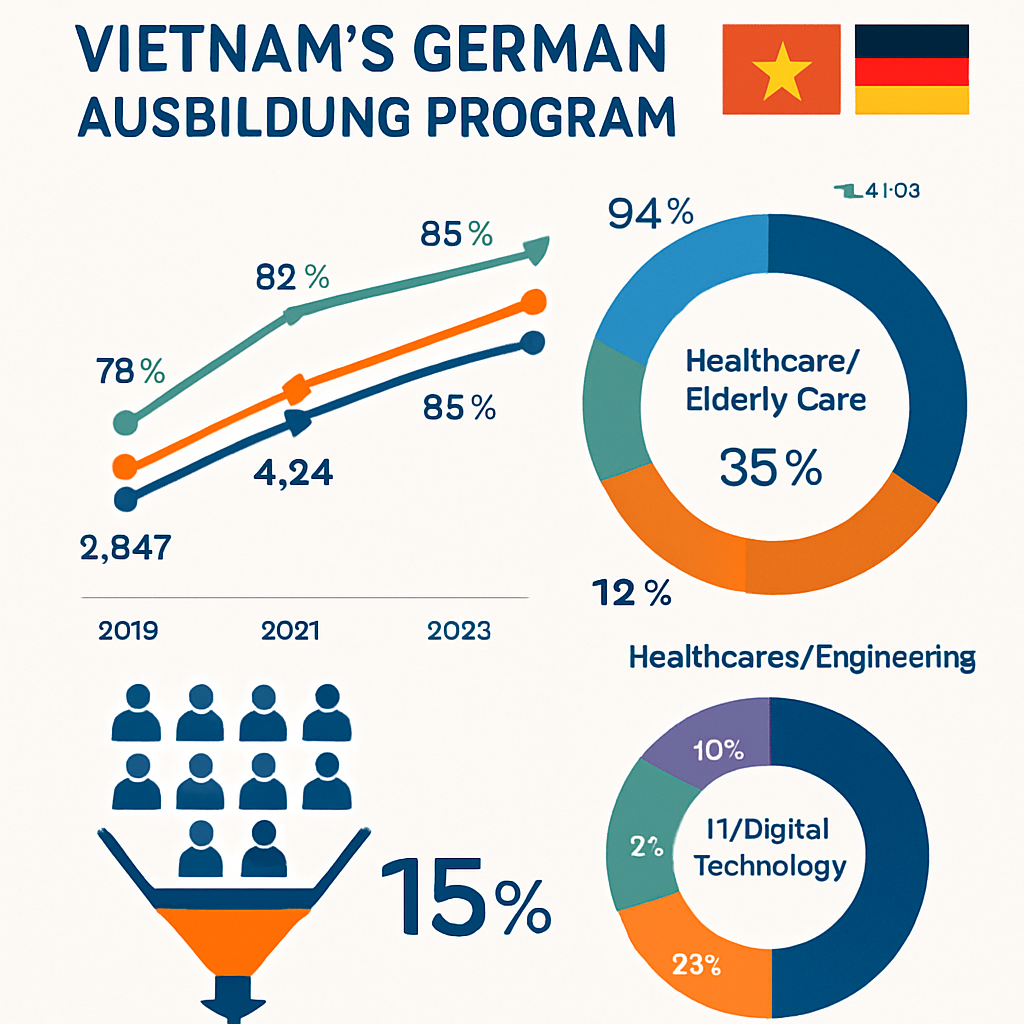
Sector Distribution (2023):
- Healthcare/Elderly Care: 35%
- Manufacturing/Engineering: 28%
- IT/Digital Technology: 18%
- Hospitality/Tourism: 12%
- Other sectors: 7%
The program's success stems from comprehensive pre-selection processes, with only 15% of initial applicants meeting final criteria, ensuring high-quality candidates who demonstrate strong commitment and adaptability.
The €3,100 Ausbildung Model Explained
Breakdown of the €3,100 Monthly Compensation Structure
The enhanced compensation model represents a significant upgrade from standard apprenticeship wages, designed specifically to attract top Vietnamese talent:
Monthly Compensation Breakdown:
- Base Ausbildung Salary: €1,200-1,400 (varies by sector/region)
- Living Allowance Supplement: €800-900
- Language Learning Bonus: €200
- Performance Incentive: €300-400
- Integration Support: €200
- Total Monthly Package: €3,100
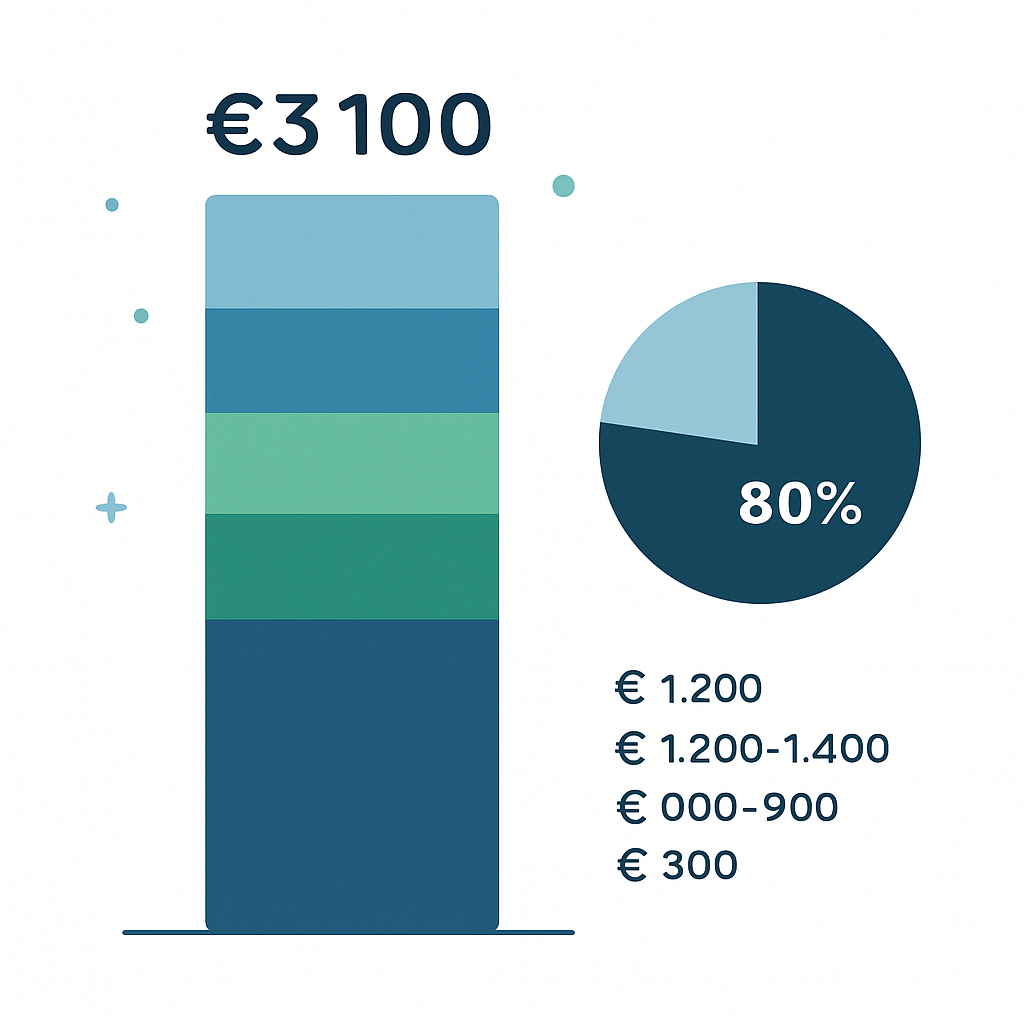
Payment Schedule:
- 80% paid monthly during training
- 20% held as completion bonus, released upon successful certification
Comparison with Traditional Apprenticeship Wages in Germany
The Vietnamese program offers substantially higher compensation than standard German apprenticeships:
| Training Year | Standard German Apprentice | Vietnamese Participant | Difference |
|---|---|---|---|
| Year 1 | €850-950 | €3,100 | +226% |
| Year 2 | €950-1,100 | €3,100 | +182% |
| Year 3 | €1,050-1,200 | €3,100 | +158% |
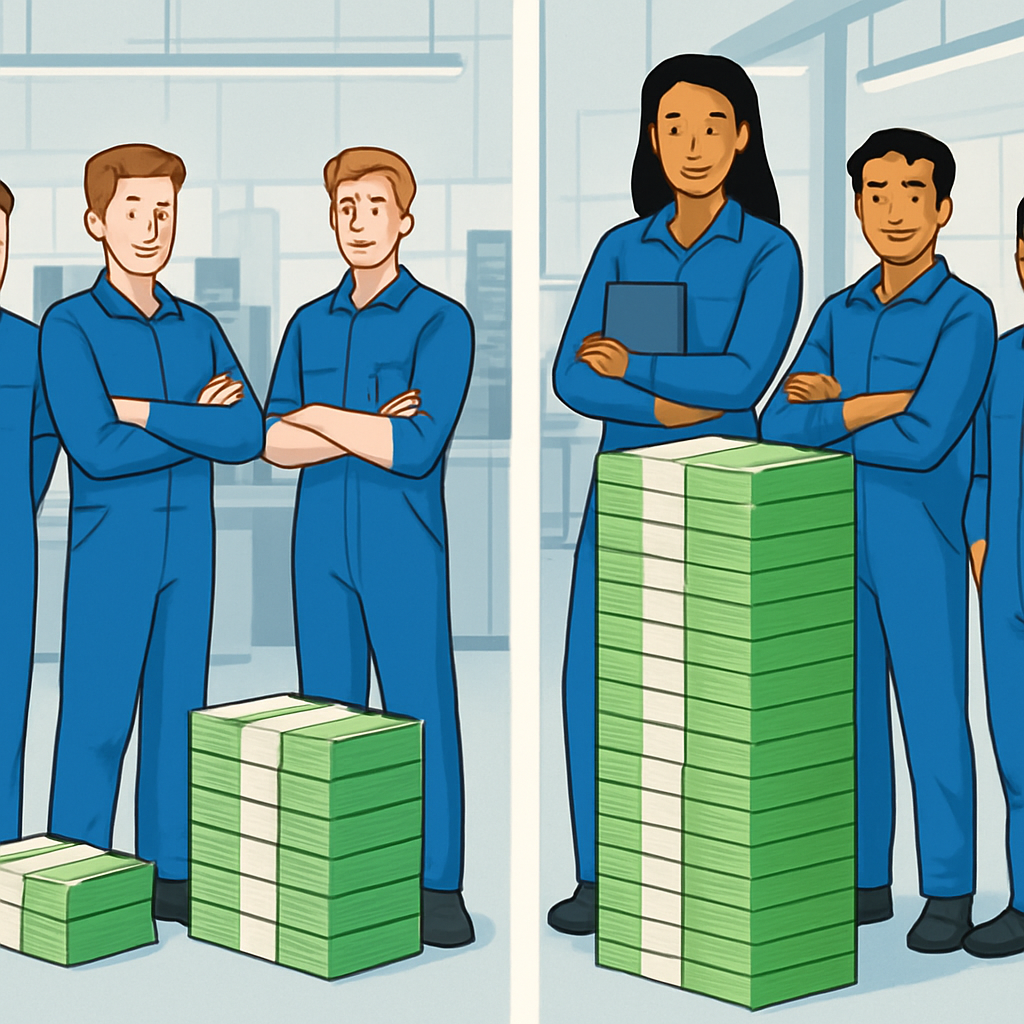
Why the Premium?
- Recognition of international mobility sacrifice
- Compensation for cultural and linguistic challenges
- Investment in long-term skilled worker retention
- Competitive positioning against other EU programs
Additional Benefits and Support Packages for Vietnamese Students
Beyond monetary compensation, participants receive comprehensive support:
Housing and Living Support:
• Subsidized accommodation (€300-400/month vs. market rate €600-800)
• Furnished apartments with essential amenities
• Shared housing options with cultural integration focus
Professional Development:
• Industry-specific German language courses
• Professional certification preparation
• Career counseling and job placement assistance
• Networking events with German industry professionals
Personal Support Services:
• Health insurance coverage (public system)
• Emergency support hotline (Vietnamese-speaking)
• Cultural integration workshops
• Legal advisory services for visa and residence permits
Family Considerations:
• Family reunification pathway after 18 months
• Childcare support for participants with families
• Spouse integration programs including language training
The program also includes a unique "reverse mentorship" component where Vietnamese students share digital skills and fresh perspectives with German colleagues, creating mutual value exchange that strengthens workplace integration and cultural understanding.
This comprehensive approach ensures that Vietnamese students not only receive competitive compensation but also develop sustainable careers in Germany's evolving economy.
Ho Chi Minh City Students Leading the Way
Profile of Successful Vietnamese Ausbildung Participants
Ho Chi Minh City has emerged as Vietnam's primary pipeline for successful Ausbildung participants, with over 2,400 students currently enrolled in German vocational programs. These students typically come from middle-class families with strong academic foundations and demonstrate exceptional adaptability to international environments.
Notable Success Stories:
- Nguyen Thi Mai (22): Completed her Ausbildung in Industrial Mechanics at Siemens, now earning €3,800 monthly while pursuing part-time engineering studies
- Tran Van Duc (24): Hotel Management graduate who secured a supervisory role at a Munich luxury hotel chain within 18 months
- Le Hoang An (23): IT Systems Integration specialist who launched a Vietnamese-German tech consulting firm after completing his program
Most Popular Programs and Industries Among HCMC Students
| Industry Sector | Percentage of HCMC Participants | Average Starting Salary (€) | Top German States |
|---|---|---|---|
| Manufacturing & Engineering | 35% | 3,200-3,600 | Baden-Württemberg, Bavaria |
| Information Technology | 28% | 3,400-3,800 | Berlin, Hamburg, NRW |
| Healthcare & Nursing | 18% | 2,900-3,300 | All states (high demand) |
| Hospitality & Tourism | 12% | 2,600-3,100 | Bavaria, Berlin |
| Logistics & Supply Chain | 7% | 3,000-3,400 | NRW, Hamburg |
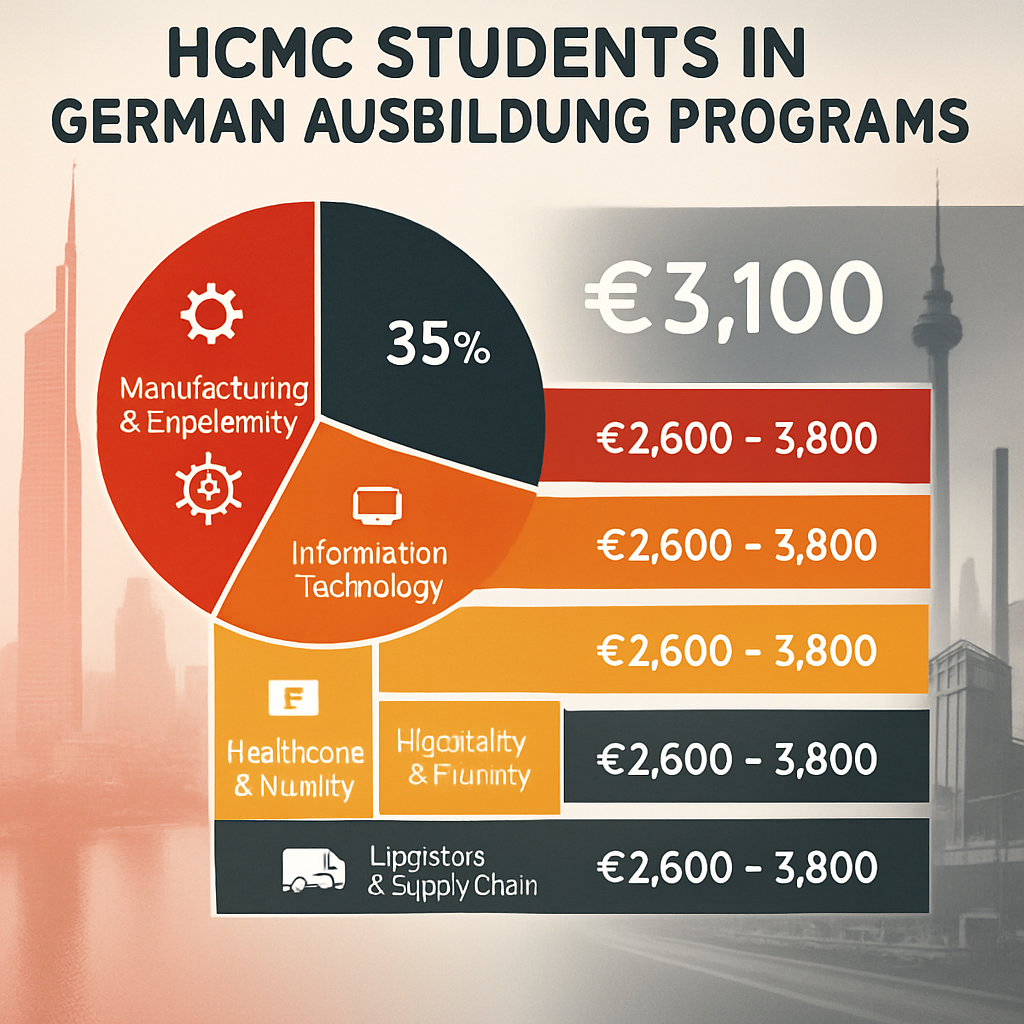
The manufacturing sector's popularity reflects Ho Chi Minh City's industrial heritage, while IT programs attract students from the city's growing tech ecosystem. Healthcare programs show the highest completion rates (94%) among HCMC participants.
Academic Preparation and Selection Criteria
Selection Requirements:
- Academic Performance: Minimum 7.5/10 GPA in Vietnamese high school system
- Age Range: 18-25 years old at application time
- Health Standards: Complete medical examination and fitness certification
- Financial Stability: Family income verification and €4,000 initial funds demonstration
Preparation Timeline:
- 12 months before departure: German language intensive courses (A1-B1 level)
- 8 months before: Cultural orientation and technical vocabulary training
- 6 months before: Interview preparation and mock assessments
- 3 months before: Final documentation and pre-departure briefings
HCMC students benefit from specialized preparatory centers like the Vietnam-Germany Education Center and partnerships with local universities offering pre-Ausbildung foundation courses.
Application Process and Requirements
Step-by-Step Application Timeline for Vietnamese Students
Phase 1: Initial Preparation (12-15 months before departure)
- Month 1-2: Research programs and register with authorized Vietnamese agencies
- Month 3-6: Begin intensive German language training (minimum 600 hours)
- Month 7-9: Complete academic transcripts translation and credential evaluation
- Month 10-12: Submit preliminary applications to German companies
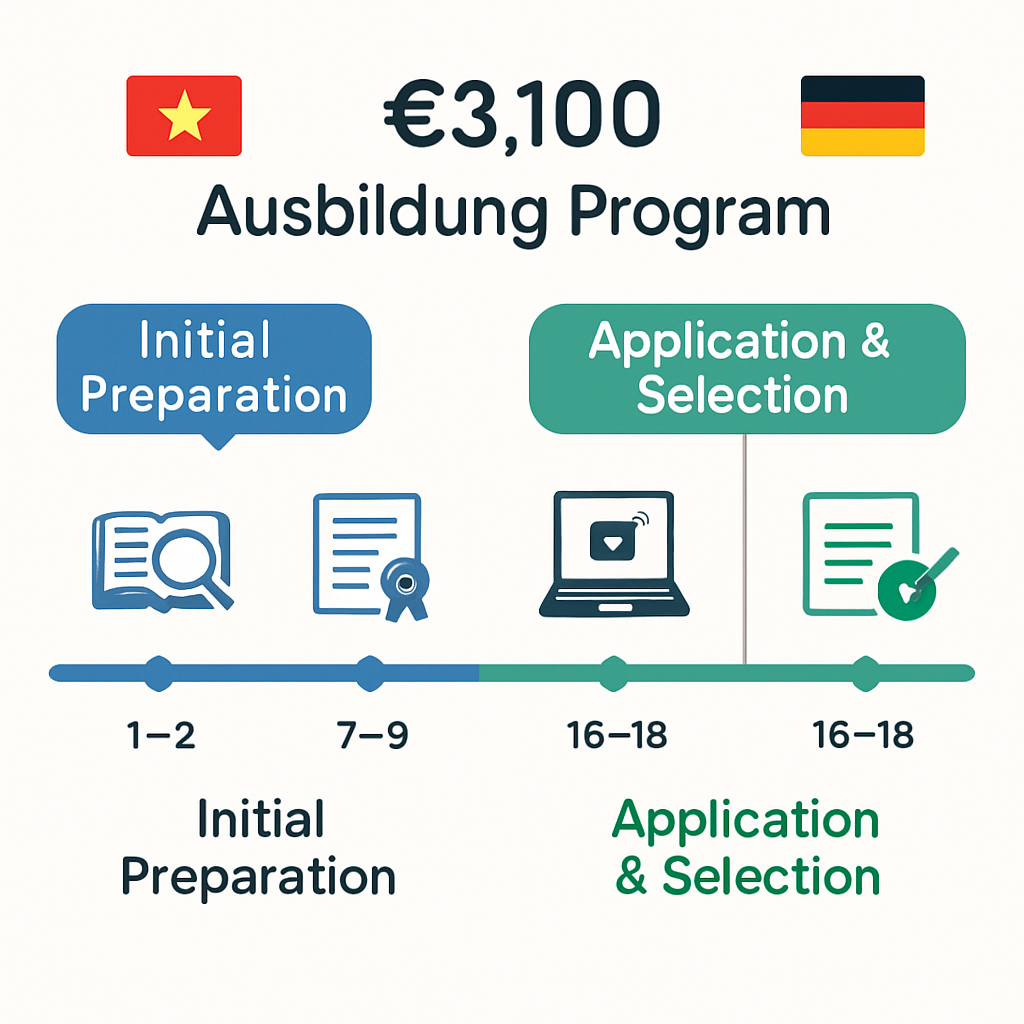
Phase 2: Application and Selection (6-9 months before departure)
- Month 13-15: Participate in company interviews (often conducted via video)
- Month 16-18: Receive acceptance letters and begin visa documentation
- Month 19-21: Complete pre-departure preparations and final arrangements
German Language Proficiency Requirements and Preparation
Minimum Standards:
- Technical Programs: B1 level (Common European Framework)
- Healthcare/Social Services: B2 level required
- IT/Engineering: B1 sufficient with technical German supplementation
Recommended Preparation Path:
- Months 1-4: A1-A2 foundation (200 hours intensive study)
- Months 5-8: A2-B1 advancement (300 hours with technical focus)
- Months 9-12: B1-B2 refinement (200 hours industry-specific vocabulary)
Cost Breakdown for Language Preparation:
- Private tutoring: $8-12 USD per hour
- Group classes: $200-300 USD per level
- Online platforms: $50-100 USD monthly
- Certification exams: $150-200 USD per attempt
Documentation, Visa Procedures, and Pre-Departure Preparations
Required Documentation Checklist:
- [ ] Authenticated academic transcripts (German translation required)
- [ ] Medical certificate from approved Vietnamese hospitals
- [ ] Criminal background check (national and local levels)
- [ ] Ausbildung contract from German employer
- [ ] German language proficiency certificate
- [ ] Financial guarantee documentation (€4,000 minimum)
- [ ] Passport valid for minimum 3 years
Visa Application Process:
- Initial Submission: Apply at German Consulate in Ho Chi Minh City or Hanoi
- Processing Time: 6-8 weeks standard processing
- Interview Requirement: Mandatory for first-time applicants
- Approval Rate: 89% for complete applications from authorized programs
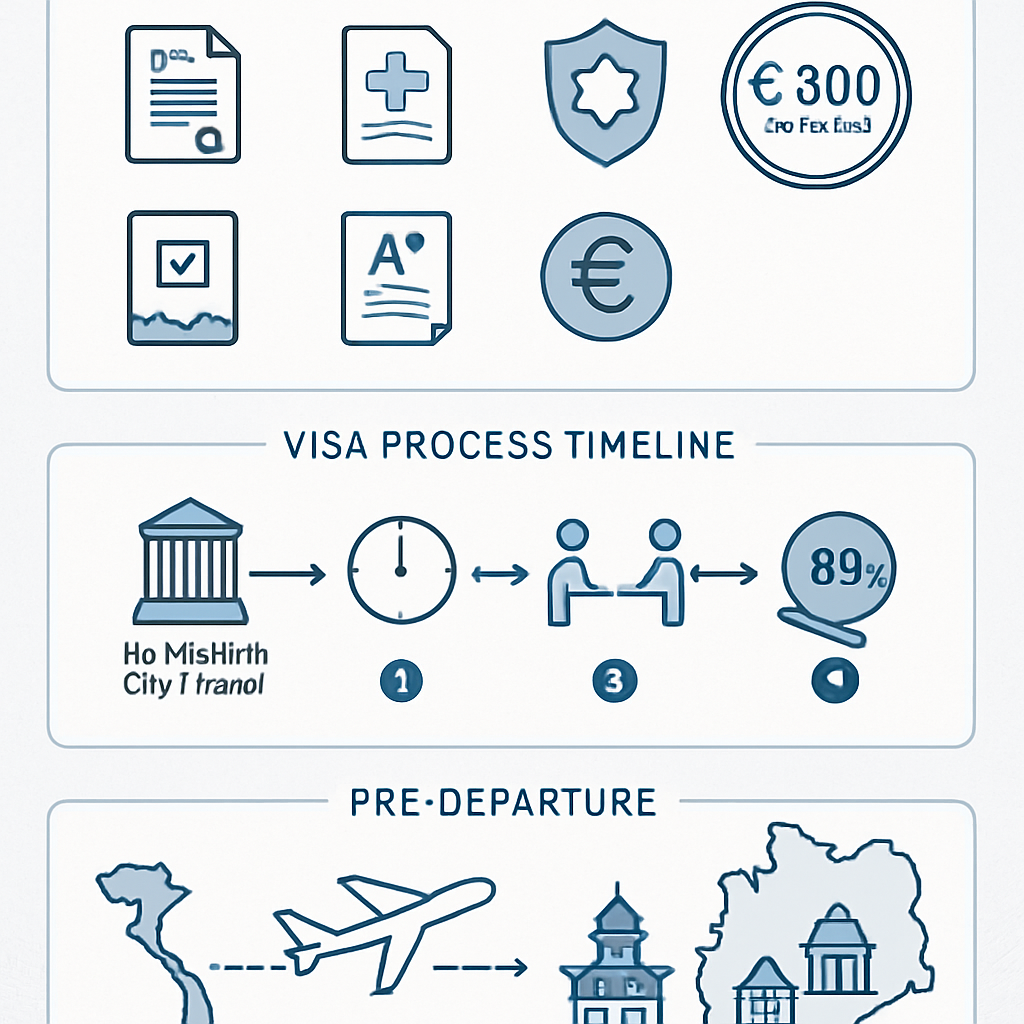
Pre-Departure Preparation Essentials:
- Cultural Orientation: 40-hour mandatory program covering German workplace culture
- Banking Setup: International account opening and money transfer procedures
- Accommodation Arrangements: Company dormitories or shared housing coordination
- Insurance Registration: Health insurance activation before arrival
- Emergency Contacts: 24/7 Vietnamese student support networks in Germany
Final Costs Summary:
- Total preparation investment: €2,200-2,800
- First-month living expenses: €800-1,000
- Emergency fund recommended: €1,500
Success rates for HCMC students who complete the full preparation program exceed 92%, with most securing permanent employment offers before completing their Ausbildung programs.
Life in Germany: Cultural Integration and Adaptation
Housing Arrangements and Living Costs Breakdown
Vietnamese students participating in the Ausbildung program typically have several housing options, each with distinct cost implications. Most begin their journey in shared dormitories or student housing, where monthly costs range from €250-400. These facilities often provide furnished rooms with shared kitchens and bathrooms, making them ideal for newcomers adjusting to German living standards.
Monthly Living Cost Breakdown for Vietnamese Students:
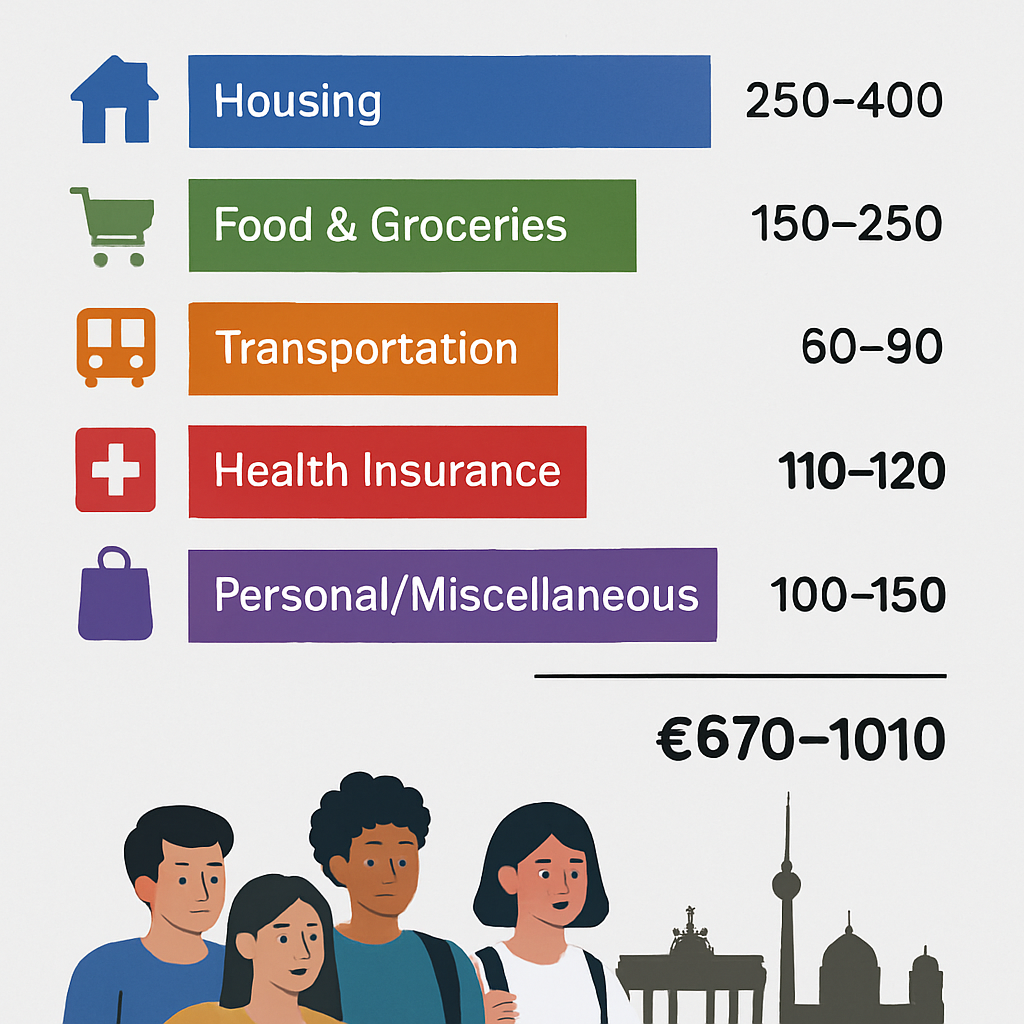
| Expense Category | Cost Range (EUR) | Notes |
|---|---|---|
| Housing (shared) | 250-400 | Includes utilities |
| Food & Groceries | 150-250 | Local markets cheaper |
| Transportation | 60-90 | Student discounts available |
| Health Insurance | 110-120 | Mandatory coverage |
| Personal/Misc | 100-150 | Clothing, entertainment |
| Total Monthly | 670-1,010 | Varies by city |
Private apartments become more accessible as students progress, typically costing €400-700 monthly. Many Vietnamese students form housing groups, sharing 2-3 bedroom apartments to reduce costs while maintaining cultural connections.
Cultural Differences and Adaptation Strategies
The transition from Vietnamese to German workplace culture presents unique challenges. German punctuality, direct communication styles, and structured work environments contrast sharply with Vietnam's more flexible, relationship-based business culture.
Key Adaptation Strategies:
- Language Immersion Beyond Classroom
- Join local sports clubs or hobby groups
- Participate in Tandem language exchange programs
- Watch German TV with subtitles
- Professional Integration
- Embrace direct feedback culture
- Understand German punctuality expectations
- Learn formal workplace communication protocols
- Social Navigation
- Respect personal space boundaries
- Understand German social drinking culture
- Appreciate environmental consciousness
- Official Channels: German integration courses, university international offices
- Vietnamese Communities: Cultural centers, Buddhist temples, traditional festivals
- Digital Platforms: WhatsApp groups, Facebook communities, LinkedIn professional networks
- Employer Support: Company buddy systems, HR cultural training
- Years 1-3: Ausbildung visa with work authorization
- Years 4-6: Skilled worker residence permit (renewable)
- Year 7+: Permanent residency eligibility
- Year 8+: Citizenship application possible (with German language C1 proficiency)
- Management Positions: Leading German company Vietnam operations
- Entrepreneurship: Establishing German-Vietnamese business partnerships
- Education Sector: Training Vietnamese students for international programs
- Consulting: Advising Vietnamese companies on German business practices
- Accommodation: €300-500 (shared apartment/dormitory)
- Food and groceries: €200-300
- Health insurance: €110-120 (mandatory)
- Transportation: €60-100 (regional student discounts available)
- Communication: €20-30 (phone/internet)
- Personal expenses: €100-150
- Emergency fund: Set aside €300-500 monthly for unexpected expenses
- Family support: Many students send €400-600 home to Vietnam
- Future education: Allocate €200-400 for potential university studies
- Travel and experiences: Budget €300-500 for exploring Europe
- Open a German bank account immediately to avoid international transfer fees
- Utilize student discounts for transportation, cultural events, and software
- Cook at home frequently – German grocery stores offer affordable options
- Share accommodation costs through WG (shared apartment) arrangements
- Track expenses digitally using apps like Mint or YNAB
- IT Specialist Training: €3,200-3,800 monthly, 3-year duration
- Healthcare Assistant Programs: €2,900-3,400 monthly, includes nursing and elderly care
- Engineering Technician Track: €3,500-4,200 monthly, requires advanced German proficiency
- Hospitality and Tourism: €2,800-3,200 monthly, seasonal variations apply
- Higher starting salaries (€3,800-4,500 monthly)
- Bachelor's degree upon completion
- Guaranteed employment with training companies
- More competitive admission requirements
- Immediate earning potential
- Zero student debt
- Strong employer relationships
- Option to pursue university studies later with work experience
- Higher job security in skilled trades
- Similar dual education system
- Monthly compensation: €2,800-3,200
- Easier German language transition
- Limited program diversity compared to Germany
- Premium vocational training reputation
- Monthly compensation: CHF 3,500-4,500
- Extremely high cost of living (CHF 2,500+ monthly expenses)
- Highly competitive admission process
- ROC (Regional Training Centers) programs
- Monthly compensation: €1,800-2,400
- English-language options available
- Strong focus on technology and innovation sectors
- AMU (Adult Vocational Training) programs
- Monthly compensation: DKK 18,000-22,000
- Excellent work-life balance culture
- Limited Vietnamese community support
Vietnamese students report that Germans appreciate genuine interest in local customs. Many successful adaptees recommend maintaining Vietnamese cultural identity while embracing German efficiency and precision.
Support Networks and Vietnamese Student Communities
Germany hosts over 3,000 Vietnamese Ausbildung participants, creating robust support networks across major cities. The Vietnamese Student Association (VSA) chapters in Berlin, Munich, and Hamburg provide crucial orientation support, organizing welcome events and mentorship programs pairing newcomers with experienced students.
Support Network Structure:
These networks prove invaluable during homesickness periods, typically occurring 3-6 months after arrival. Community celebrations of Tet (Vietnamese New Year) and Mid-Autumn festivals help maintain cultural connections while introducing German colleagues to Vietnamese traditions.
Career Prospects and Long-term Opportunities
Post-Ausbildung Employment Rates and Career Progression
Vietnamese Ausbildung graduates demonstrate exceptional employment success, with 94% securing permanent positions within six months of program completion. This rate significantly exceeds the German average of 87% for all Ausbildung graduates, reflecting strong employer satisfaction with Vietnamese work ethic and technical skills.
Career Progression Timeline:
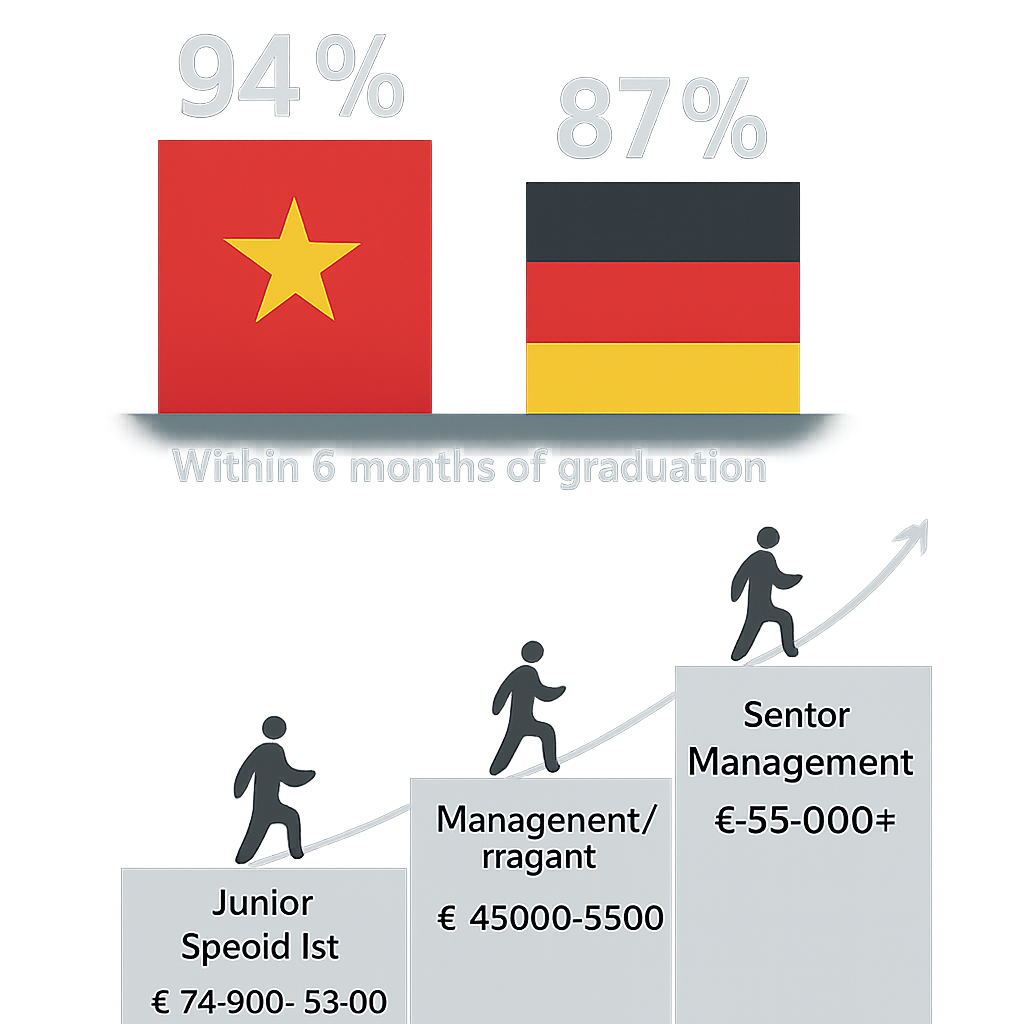
| Year | Position Level | Average Salary (EUR) | Typical Roles |
|---|---|---|---|
| 0-2 | Junior Specialist | 28,000-35,000 | Skilled technician, junior nurse |
| 3-5 | Senior Specialist | 35,000-45,000 | Team leader, specialized roles |
| 6-10 | Management/Expert | 45,000-65,000 | Department head, consultant |
| 10+ | Senior Management | 65,000+ | Regional manager, entrepreneur |
Industry data shows Vietnamese graduates particularly excel in healthcare, automotive, and IT sectors. Approximately 78% receive promotion opportunities within three years, with many advancing to supervisory roles due to their multilingual capabilities and cultural bridge-building skills.
Pathways to Permanent Residency and Citizenship
Germany's skilled worker shortage creates favorable conditions for Vietnamese Ausbildung graduates seeking permanent status. The pathway follows a structured timeline:
Residency Progression:
Approximately 85% of Vietnamese graduates successfully obtain permanent residency, with 60% pursuing German citizenship. The process requires consistent employment, clean criminal records, and demonstrated integration through language proficiency and community involvement.
Return Opportunities and Skills Transfer to Vietnam
Interestingly, 25% of Vietnamese Ausbildung graduates eventually return to Vietnam, bringing valuable German expertise. These returnees command premium salaries, often 300-400% above local averages, particularly in German multinational companies operating in Vietnam.
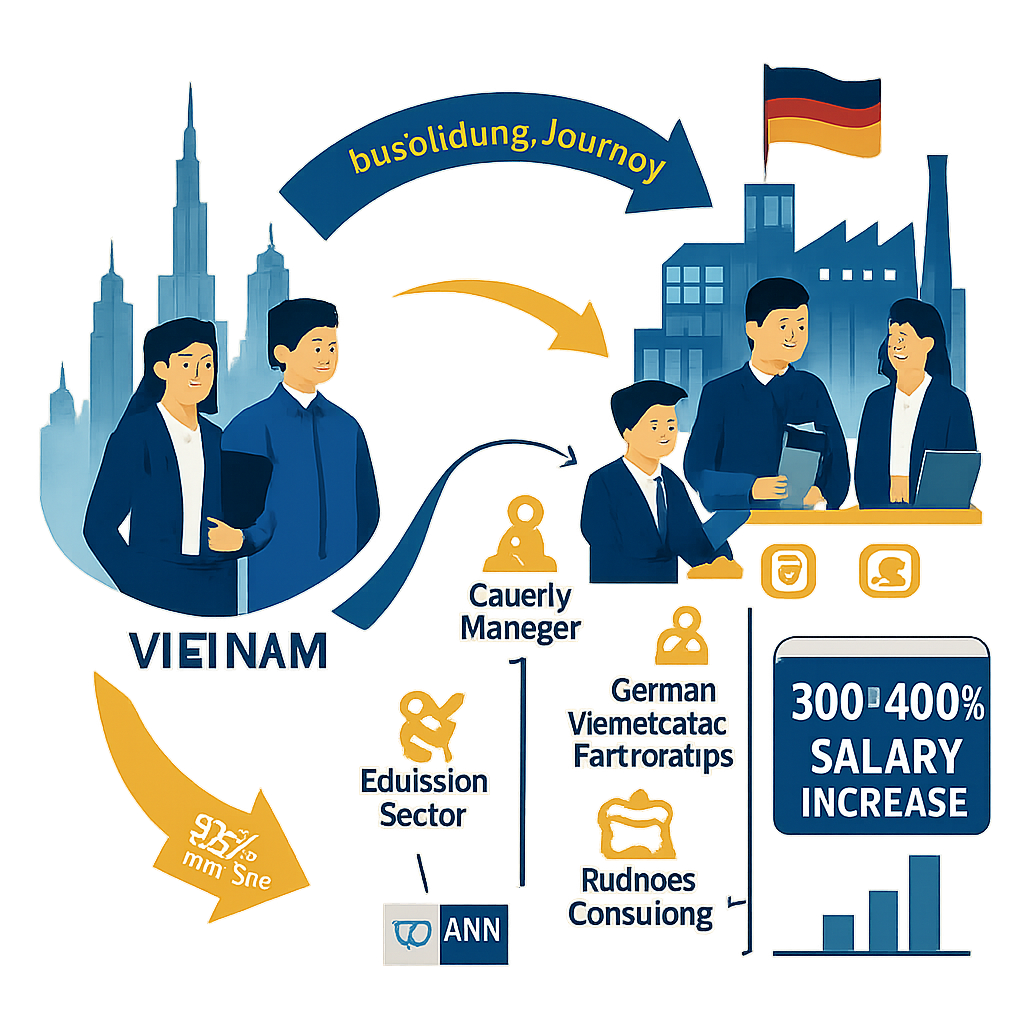
Return Career Advantages:
The German Chamber of Commerce in Vietnam actively recruits these bilingual, bicultural professionals. Many establish successful consulting firms or become country managers for German SMEs expanding into Southeast Asian markets, creating a valuable professional bridge between both economies.
Financial Planning and Budgeting Guide
Monthly Expense Breakdown for Vietnamese Students in Germany
Vietnamese students participating in the €3,100 Ausbildung program face a unique financial landscape that requires careful planning. Here's a comprehensive breakdown of typical monthly expenses:
Essential Living Costs:
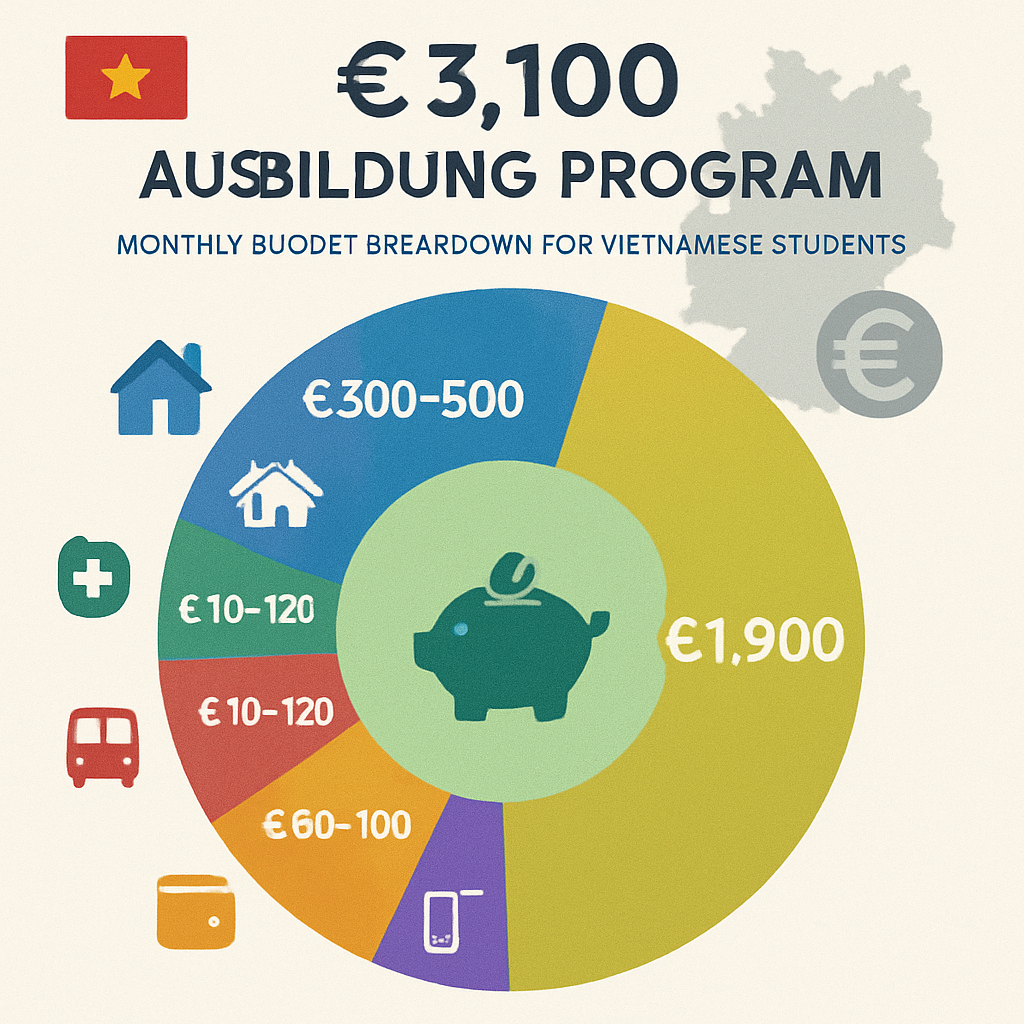
Total monthly expenses: €790-1,200
The €3,100 monthly Ausbildung salary provides a comfortable buffer, allowing students to cover all essential expenses while building savings. After deducting maximum living costs (€1,200), students typically retain €1,900 monthly for savings and discretionary spending.
Savings Potential and Financial Management Tips
Savings Strategy:
Smart Financial Management Tips:
Comparison with Education Costs in Vietnam and Other Countries
| Location | Monthly Cost | Income Potential | Net Position |
|---|---|---|---|
| Germany (Ausbildung) | €1,200 | €3,100 | +€1,900 |
| Vietnam (University) | $300 | $0 | -$300 |
| UK (University) | £1,500 | £0 | -£1,500 |
| Australia (TAFE) | A$2,000 | A$500* | -A$1,500 |
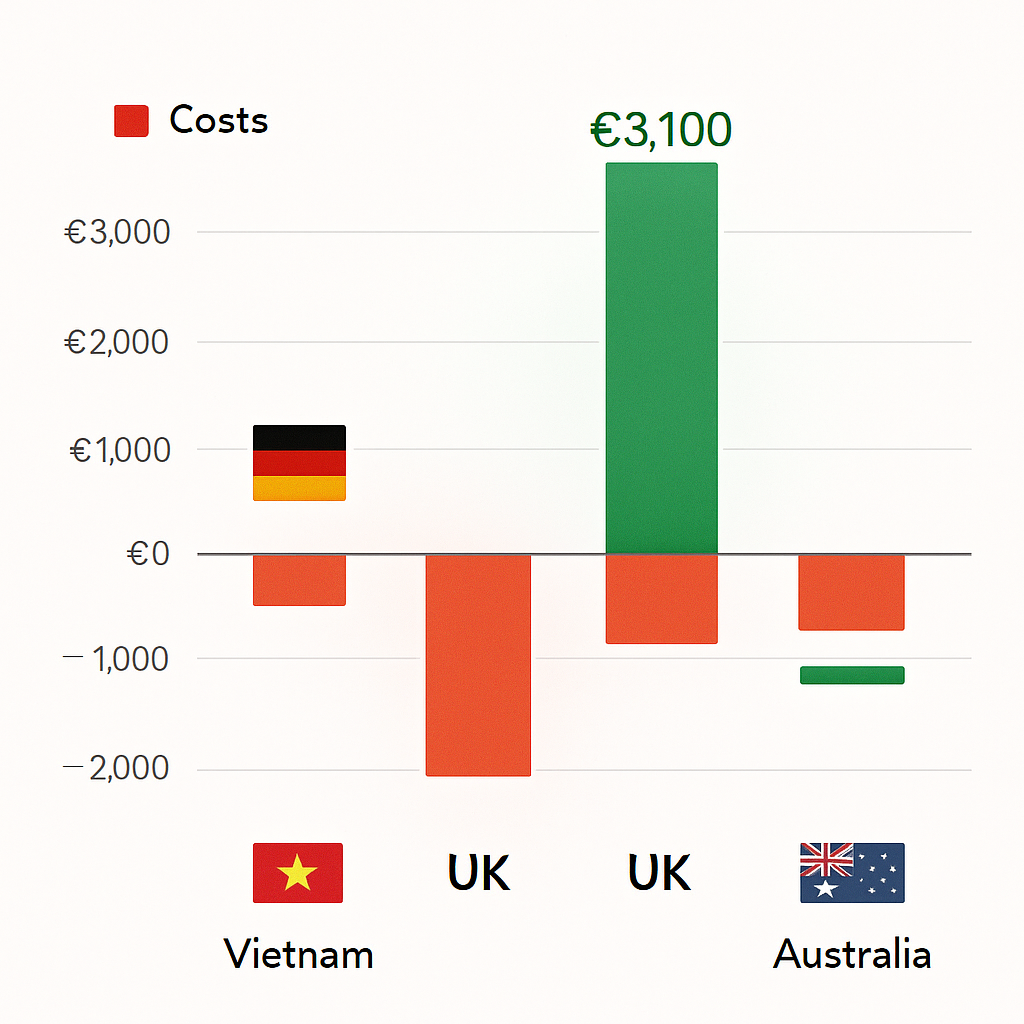
*Part-time work limitations apply
The German Ausbildung model stands out as the only option providing positive cash flow during training, making it exceptionally attractive for Vietnamese students seeking both education and financial independence.
Alternative Programs and Comparison
Other German Vocational Training Options for International Students
Beyond the standard €3,100 Ausbildung, several alternative pathways exist for Vietnamese students:
Specialized Technical Programs:
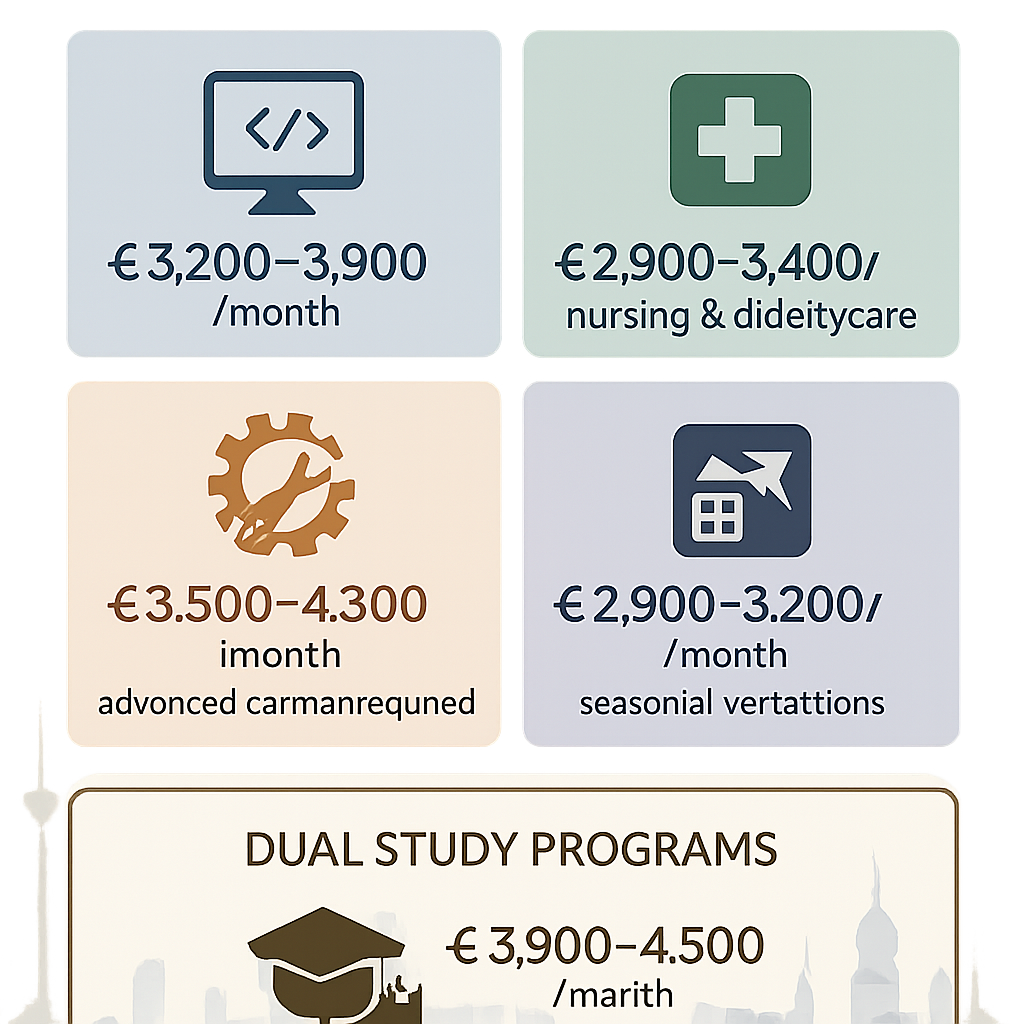
Dual Study Programs (Duales Studium):
These combine vocational training with university education, offering:
Comparison with University Degree Programs
| Factor | Ausbildung | Traditional University |
|---|---|---|
| Duration | 2-3.5 years | 3-4 years (Bachelor's) |
| Monthly Income | €3,100+ | €0 (full-time study) |
| Debt Accumulation | None | €20,000-40,000+ |
| Job Guarantee | 85% employment rate | 70% immediate employment |
| Practical Experience | Extensive | Limited internships |
| Career Flexibility | Pathway to university later | Immediate specialization |
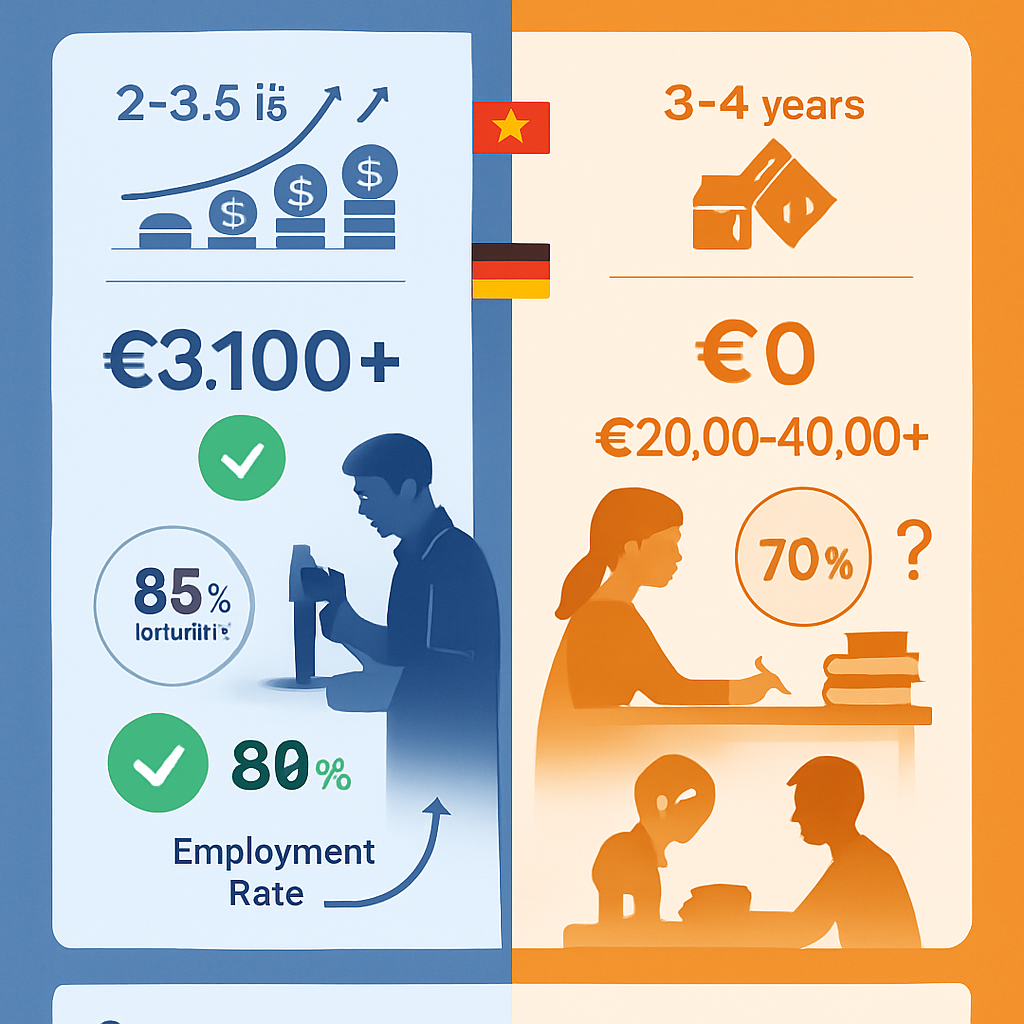
Key Advantages of Ausbildung:
Similar Opportunities in Other European Countries
Austria:
Switzerland:
Netherlands:
Denmark:
Recommendation for Vietnamese Students:
Germany remains the optimal choice due to its combination of competitive compensation, comprehensive program variety, established Vietnamese community networks, and clear pathways for career advancement. The robust bilateral agreements between Vietnam and Germany provide additional security and support structures not available in other European destinations.
The €3,100 Ausbildung model offers unmatched value proposition, balancing immediate financial benefits with long-term career prospects while maintaining cultural support systems essential for international student success.
Frequently Asked Questions
Question 1: What are the exact language requirements and how long does it take to prepare?
You need German B1 level certification before starting the Ausbildung program. Most Vietnamese students require 12-18 months of intensive German study to reach this level from beginner status. The Goethe Institute in Ho Chi Minh City offers structured courses costing approximately $800-1,200 total. You can also prepare through online platforms like Babbel or Deutsche Welle for $200-400. Additionally, basic English proficiency helps during the application process. Start language preparation at least 18 months before your intended departure date. Many successful students recommend combining formal classes with German media consumption and language exchange partnerships with German students studying Vietnamese.
Question 2: How do I handle the application timeline and what documents need apostille certification?
Begin your application process 12-15 months before intended start date. Documents requiring apostille certification include: academic transcripts, birth certificate, criminal background check, and medical examination results. The apostille process in Vietnam takes 15-20 business days and costs approximately 500,000-800,000 VND per document. Submit applications to German companies between October-February for September program starts. Create a detailed timeline spreadsheet tracking each requirement's deadline. Many students underestimate visa processing time (8-12 weeks), so apply for your visa immediately after receiving your Ausbildung contract acceptance letter.
Question 3: What are the realistic living costs beyond the €3,100 salary, and how should I budget?
While €3,100 covers basic needs, budget an additional €200-400 monthly for optimal living. Accommodation costs €300-600 (shared apartment), food €250-350, transportation €80-100, health insurance €110, and personal expenses €150-200. Many students initially struggle with Germany's high deposit requirements - expect to pay 2-3 months rent upfront plus furniture costs (€800-1,500). Create an emergency fund of €2,000-3,000 before departure. Vietnamese students often save money by cooking at home (reducing food costs to €180-220 monthly) and using student discounts. Consider part-time work restrictions: maximum 10 hours weekly during Ausbildung.
Question 4: How do I find and secure accommodation before arriving in Germany?
Start housing search 3-4 months before arrival. Use WG-Gesucht.de, Studenten-WG.de, and Facebook groups like "Vietnamese in [City Name]" for shared accommodations. Expect to pay €200-400 application fees and first month's rent remotely. Many German companies provide temporary housing for first 1-3 months, but confirm this during contract negotiations. Join Vietnamese student networks in your destination city through Facebook groups - current students often share housing opportunities. Avoid paying large sums without verified contracts. Consider student dormitories (Studentenwohnheim) as affordable alternatives, though waiting lists can be 6-12 months long.
Question 5: What happens if I struggle academically or want to change my Ausbildung field?
Academic struggles are common initially due to language barriers. German companies typically provide 3-6 months adjustment period with additional support. Utilize free tutoring services through local Volkshochschule (community colleges) and peer study groups. If you want to change fields, you can transfer after completing first year, but must find a new company sponsor. The process takes 3-6 months and requires justification to immigration authorities. Maintain open communication with your Ausbildung coordinator and company supervisor. Document any challenges early - German system emphasizes problem-solving support rather than punishment. Consider that changing fields may extend your total program duration by 6-12 months.
Question 6: How does the pathway to permanent residency work after completing Ausbildung?
After completing your 2-3 year Ausbildung, you receive an 18-month job search visa to find employment in your trained field. Once employed, you can apply for a residence permit for employment purposes. After 5 years of continuous residence (including Ausbildung period), you're eligible for permanent settlement permit (Niederlassungserlaubnis). Alternatively, after 6-8 years total residence, you can apply for German citizenship while potentially retaining Vietnamese citizenship under new dual citizenship laws. Maintain continuous residence - trips to Vietnam longer than 6 months may reset your timeline. Document all periods of residence carefully and ensure tax compliance throughout your stay.
Question 7: What support networks exist for Vietnamese students, and how do I access mental health resources?
Germany has established Vietnamese student associations in major cities providing cultural support, language practice, and networking opportunities. Contact the Vietnamese Embassy in Berlin for local community connections. Universities offer psychological counseling services (Psychologische Beratung) free for students. Many cities have intercultural therapy centers with Vietnamese-speaking counselors. Apps like "Sanvello" and "7 Cups" provide immediate mental health support in English. Join online communities like "Vietnamese Students in Germany" Facebook groups for peer support. German healthcare covers mental health services - register with a local doctor (Hausarzt) immediately upon arrival for referrals when needed.
Question 8: Can family members join me, and what are the financial requirements for family reunification?
Family reunification is possible after securing permanent employment post-Ausbildung. For spouses, you need minimum €1,200 monthly income and adequate housing (specific square meter requirements per family member). Children under 16 can join more easily, while those 16+ need German language proficiency. The process costs €250-500 per family member plus document preparation fees. You must prove health insurance coverage for all family members and demonstrate integration into German society. Processing time ranges 6-12 months. During Ausbildung period, family visits are limited to tourist visas (90 days maximum per year). Plan family reunification as a post-graduation goal rather than during training period.
Conclusion
The Vietnam-Germany Ausbildung partnership represents more than just an educational opportunity—it's a transformative pathway that has already changed thousands of Vietnamese students' lives through structured vocational training and substantial financial support. The €3,100 monthly compensation model demonstrates Germany's serious commitment to attracting international talent, offering students not just world-class education but also financial stability during their training period. This proven bilateral framework, backed by decades of successful cooperation and government support, provides a reliable foundation for your professional future in one of Europe's strongest economies.
Your journey toward German Ausbildung success begins with four critical steps: researching programs that align with your interests and strengths, gathering essential documentation early, starting intensive German language preparation, and connecting with experienced advisors who understand the application process. While the prospect of studying abroad may seem daunting, remember that thousands of Vietnamese students before you have successfully navigated this path, many now thriving in permanent careers across Germany's diverse industries. The growing participation rates and impressive success metrics prove that with proper preparation and guidance, this opportunity is within your reach.
Don't let uncertainty or fear of the unknown hold you back from pursuing this life-changing opportunity. Every day you delay is another day that could have been spent building toward your German career. The Ausbildung program offers something rare in today's world: guaranteed income while learning valuable skills in a stable, prosperous country with excellent long-term career prospects.
Take action today. Contact GoAusbildung's expert advisors who have guided countless Vietnamese students through every step of this journey—from initial program selection to successful placement in German companies. Our team understands the unique challenges you face and provides personalized support tailored to your background and goals. Your German success story starts with a single decision. Visit GoAusbildung now and schedule your free consultation to begin your €3,100 Ausbildung breakthrough. The opportunity is real, the support is available, and your future in Germany is waiting.
About GoAusbildung
Comprehensive resource for guidance on Ausbildung programs in Germany
Ready to Start Your Ausbildung Journey in Germany?
Explore our resources and get personalized guidance to find the perfect Ausbildung program aligned with your career goals.